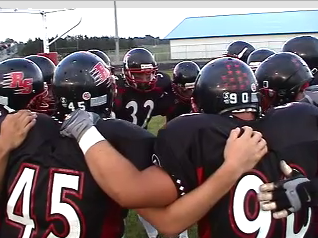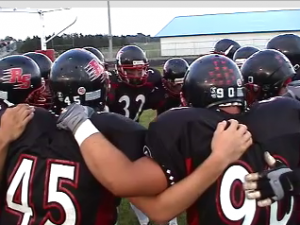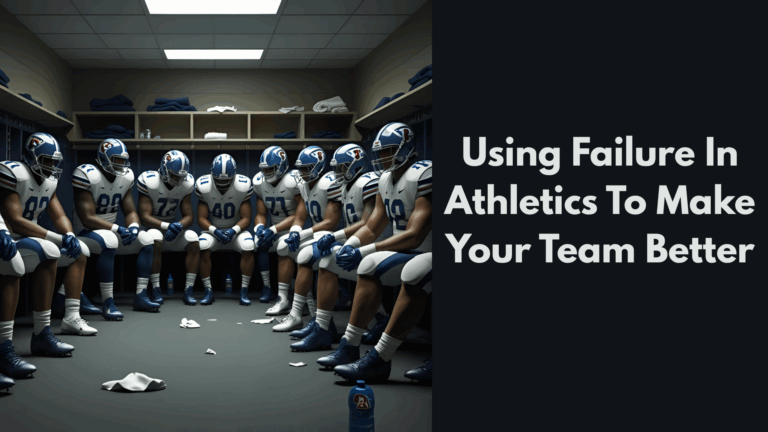
This is the second part of a series from Dr. Jared M. Wood, a sports psychologist who I really believe in. See Part 1 here.
By Jared M. Wood, Ph.D.
So what does the team need from you?
Certainly, the team needs you to understand your assignment and to give your best to win each play you are involved in, but you can do better than that. The off-season is a particularly good time to realize that your roles as leader, follower, and teammate extend far beyond the field of play.
Consider these questions:
- Does your team need you to pick them up with positive talk between reps or plays, effective communication about game situations, or motivational pledges to each other to have a great practice or training session?
- Does your team need you to lead by example, giving a great effort in everything you do?
- Does your team need you to read the scouting report, remind others to do the same, and shout out tendencies when you recognize them?
- Does your team need you to cheer them on or pick up even one other person with words of encouragement?
- Does your team need you to be calm under pressure, learn from mistakes, and focus on what TO DO to make a play work?
- Do you need to not only do your assignment but make the play – going above and beyond just your own assignment to do whatever it takes to help your team win the play?
- Does your team need you to be the voice of reason and remind others – maybe even forcefully tell others – to do what is right: be intelligent and studious; be responsible in regard to drugs and alcohol; and be respectful in regard to treating others as you want to be treated?
- Does your team need you to stop being such a good backup and begin to push the starter for playing time, encouraging him to get better in the process?
- If you already start, does your team need you to challenge the backups, creating competition, making everyone better in the process?
- Does your team need something not already mentioned, an important contribution only you can make?
The question is up to you. What does your team need from you? If you can’t answer it, you need to ask your coaches and teammates. They will know, and they can help. But you must put in the effort. Challenge them to make you better. The team’s success depends on it. You are responsible for yourself, but you are accountable to the team.
This off-season, I want you to begin to commit to the process of being a leader, follower, and teammate. What’s the difference? A leader does what it right no matter what is going on around him. A follower seeks others who are doing what is right, follows their lead, and in the process may even be transformed into a leader when others notice him and begin to follow. The teammate role kicks in when the individual realizes that he is both a leader and follower and acts purposefully to help the team reach its goal, which has a tremendous impact on others around him.
Let me give an example of how this works. Let’s say this off-season, you are giving a great effort in strength training, giving everything to each rep, as if it were the last one you are every going to take. Others will surely take notice of this effort, and at least one other person is likely to follow your lead. If this athlete does a good job picking up his intensity, others are sure to notice him, and now your follower has become a leader himself. Soon after you lead another teammate to greater effort, you might notice that in another corner of the weight room one of your teammates is actively and intensely encouraging others while he gets in his rest between sets.
You realize that while you were busting your butt on each rep during the set, you rested quietly by yourself while others took their reps and spotted. You decide right then to follow the example of the enthusiastic leader and start to enthusiastically encourage others around you to give a great effort. You have now become an excellent follower, and when others around you pick up on your enthusiasm, you will be a leader as well as a follower, all at the same time.
When you begin to understand that you are both a leader and follower and you start to be accountable to both of those roles, then you are a true teammate.
Dr. Jared Wood is a sport psychology consultant. He recently completed and published a sport psychology training manual for players and coaches, It’s Only Cold On One Sideline. Visit 1sideline.com and join as a member to become part of a community of coaches and athletes dedicated to peak performance. Along with free material, such as his Winning Time Training Journal and Championship Confidence: 9 Essential Lessons for Creating Championship Confidence, Mastering Your Mindset, & Crushing the Competition, the manual and other resources are available for purchase. He can be contacted at jaredwood@mac.com.


